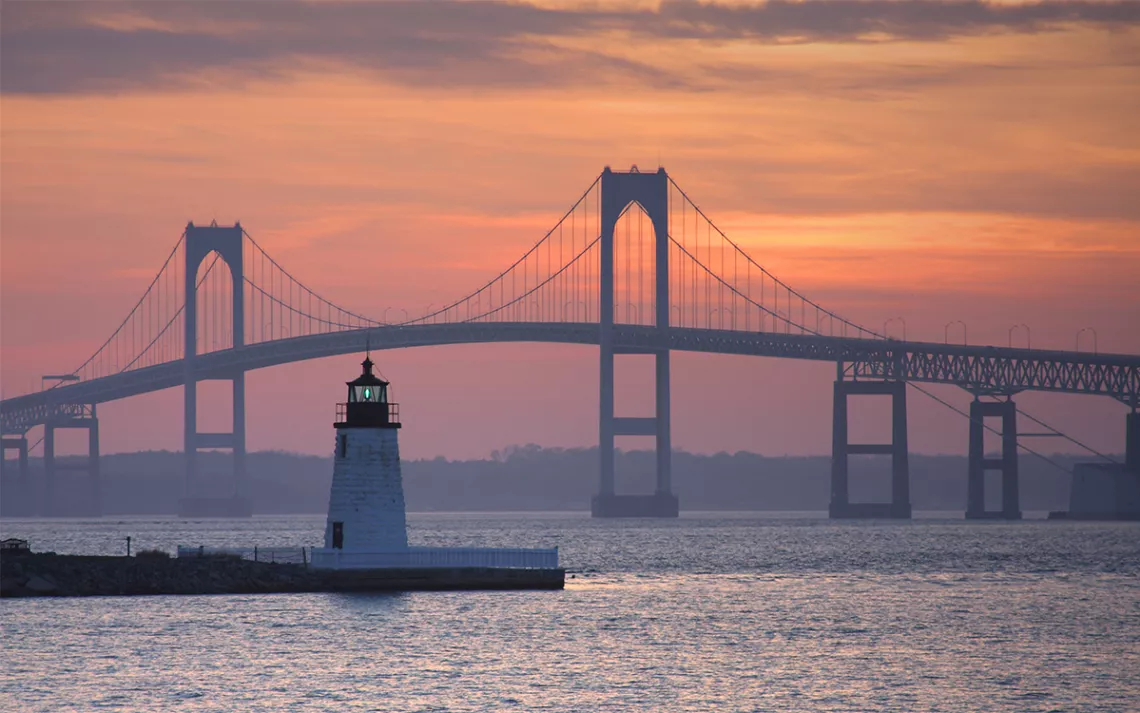Rhode Island Becomes First State to Sue Big Oil Over Climate Change
The Ocean State seeks to recover costs associated with climate impacts

Photo by DenisTangneyJr/iStock
After a federal judge last week dismissed a lawsuit by San Francisco and Oakland seeking to recover climate-change-related damages from the major oil corporations, some legal observers said the ruling would likely put a damper on similar climate liability suits. Leaders in Rhode Island just proved those legal prognosticators wrong.
On Monday, Rhode Island attorney general Peter F. Kilmartin announced that his office has filed suit in state court against 21 fossil fuel companies—including giants like ExxonMobil, Chevron, and BP—for causing damage to public and private property in the state, even as those corporations were aware of the potential destruction from human-driven climate change. Already, cities and counties nationwide—including New York City and King County, Washington—have launched various legal challenges against the largest carbon polluters. The attorneys general of Massachusetts and New York are investigating ExxonMobil for investor and consumer fraud, alleging that the oil major misled the public and shareholders about the inherent dangers of its business model. The Rhode Island suit marks the first case in which a state is seeking a jury trial to recover climate-change-related damages. (For more, see Sierra’s May/June cover story about climate change accountability.)
“For a very long time, there has been this perception that ‘Big Oil’ was too big to take on, but here we are—the smallest state—taking on some of the biggest corporate polluters in the world,” Attorney General Kilmartin said in a statement announcing the lawsuit. “The defendants have contributed greatly to the increased costs associated with climate change, and as such, should be held legally responsible for those damages.”
Rhode Island may be small, but with 400 miles of coastline, the Ocean State is particularly vulnerable to sea level rise associated with global warming. The state’s lawsuit alleges, “Rhode Island has already incurred, and will foreseeably continue to incur, injuries and harms from sea level rise . . . extreme heat days . . . [and] disruptions to the hydrological cycle.” The complaint says that a seven-foot rise in sea levels (which could happen by the end of this century, according to a 2017 NOAA study) would jeopardize infrastructure across the state, including at least 175 miles of roads and 90 bridges. The state’s two main ports, the Port of Providence and the Port of Galilee, could experience both short- and long-term disruptions due to storm surges and flooding. An estimated 4,000 homes and 800 commercial properties would be inundated if sea levels were to rise seven feet.
In an echo of city and county lawsuits, the Rhode Island complaint alleges that the fossil fuel corporations failed to warn government officials and the general public about the risks posed by their products, and that those energy companies created and contributed to a public nuisance. The introduction to the lawsuit states, “By this action, Rhode Island seeks to ensure that the parties who have profited from externalizing the responsibility for sea level rise, drought, extreme precipitation events, heat waves . . . caused by global warming . . . bear the costs of those impacts on Rhode Island.”
Governor Gina Raimondo drove that point home in her own statement: “Working families shouldn’t have to pay for the willful ignorance of big oil, big gas, and big coal companies. . . . I pledge to offer any and all assistance necessary to make those responsible for climate change pay.”
Rhode Island has followed the lead of New York City and other local governments in California, Colorado, and Washington by filing its climate liability suit in state court. The lawsuit dismissed last week was in federal court, and legal scholars are in general agreement that state courts may be more receptive to the climate liability claims.
“State nuisance law is much more favorable for the cities and the state,” Ann Carlson, a professor of environmental law at the UCLA School of Law, wrote to Sierra in an email. “The federal ruling doesn't really have much bearing on those cases. As a result, other states could also decide to sue or could sit back a bit and wait to see what happens in the suits that remain in state court.”
In other words, the state and local efforts to hold the major carbon polluters liable for climate change are very far from over.
 The Magazine of The Sierra Club
The Magazine of The Sierra Club



